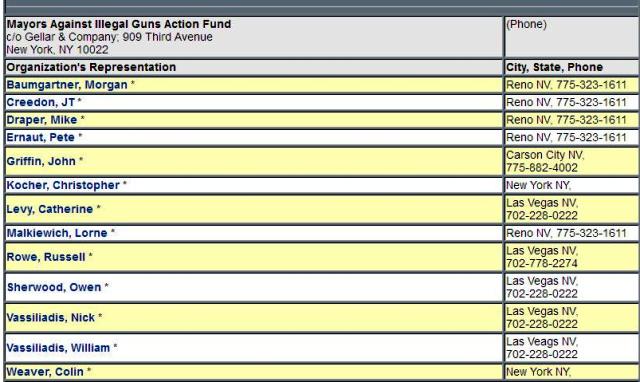My first post on this topic looked at the long game being played by Michael Bloomberg and his minions at Everytown Moms for Illegal Mayors. Some have postulated, and I would tend to agree, that the ultimate goal of these initiatives is to discourage new entrants to the gun culture rather than merely imposing a universal background check system state-by-state.
Since last Tuesday when Initiative 594 won in Washington State, I’ve been thinking about the factors that led to Washington State being chosen as the test bed and what they may tell us about who gets chosen as the next target (after Nevada).
The first, and most obvious factor, is that the state must have some form of initiative process. The initiative process and the referendum were children of the Progressive Movement of the late 19th and early 20th centuries. The movement, unlike today’s progressives, was not synonymous with liberalism. If anything, it was a reaction to the masses of immigrants to the United States and the impact that they had on politics in cities and states. The Progressive Movement was anti-political machine and what better way to take power out of the hands of Tammany Hall and other political machines that catered to new immigrants as well as from the “robber barrons” than through the promotion of direct democracy. The key components were the initiative, the referendum, and the recall.
The states that adopted the direct and indirect initiative are primarily west of the Mississippi. Of the 21 states that offer some form of initiative, only four are east of the Mississippi. These are Maine, Massachusetts, Michigan, and Ohio. A little explanation of the difference between the two types of initiatives. The direct initiative such as was seen in Washington State means the proposals that qualify go directly to the voters. By contrast, an indirect initiative is a petition to a state legislature to pass a certain bill and then, if they fail to do so, it goes to the voters to decide. This is the process used in Nevada.
The next factor that I thought would have an impact was the proportion of the state’s residents that were actually born there. I call this the “Californication” factor. In other words, people move from California to other states such as Nevada, Oregon, and Washington and bring their California attitudes with them. We see a similar pattern in the East as in-migrants from states like New York, New Jersey, and Massachusetts have altered the politics of states like Florida and Maine. I think state natives are less likely to be swayed by Bloomberg’s efforts.
Another factor that I thought should be considered is the degree of urbanization of the state. Urban dwellers are less connected to the land, less likely to have come from a hunting family, and more likely to see firearms as a crime problem. By contrast, the higher the percentage of gun ownership, the more likely people are going to be to stand up for their gun rights.
Below is an Excel spreadsheet that I composed using these factors along with which party holds the governorship, did the state vote for Obama, and has Everytown/MAIG registered a 503(c)(4) or (c)(3) in that state.
I have ordered the states by their average rank based upon the variables seen. The lower the average rank, the more likely the state is to be a target for Bloomberg and his henchmen (or henchmoms, as the case may be).
Let me explain how I derived the ranks for each variable.
Initiative Type – I considered the direct initiative to have less political impediments for Everytown so it was coded a “1” while the indirect initiative is a “2”.
Percentage of Urbanization – This data was taken from the Iowa Community Indicators Program which looked at the urbanization of the population of a state. This is 2010 data. I rank ordered the state from most urbanized to least urbanized.
Percentage of State Native Born – This looks at the percentage of the state’s residents that were born in that state. The rank goes from the lowest percentage of state native born to the highest percentage of people born in the state in which they are residing.
Percentage of Gun Ownership – This data was taken from estimates of gun ownership by state as of 2007. I rank ordered the states from least percentage of gun ownership to most percentage of gun ownership.
Governorship – I originally coded states with Democrat governors as a “1” with states having a Republican governor as a “3”. Upon reflection, I reversed it because a state with a Republican governor should create more impediments to gun control and thus would encourage the gun prohibitionists to seek ways around the governor.
2012 Presidential Election – This looked at who won the state: Obama or Romney. I considered states that chose Obama would be more likely to look favorably on gun control and thus were coded a “1”. An alternative view is that these states have more low-information voters.
Everytown 503(c)(4) – Has Everytown or MAIG registered a political action non-profit in that state? If so, it means they have prepared the ground in advance of seeking an initiative. The impetus to look for this variable came from a column by David Codrea describing the move to the states by Bloomberg. This data is up-to-date as of yesterday. More states have been added since David’s first alert on their moves.
Examining these rankings, it then comes as no surprise that Nevada was the next target for a universal background check initiative. They had the lowest average of any state. The degree of urbanization – 94.2% – and the small number of state native born – 24.3% – made Nevada an ideal candidate. The fact that many of the state’s in-migrants come from California adds to the problem.
Likewise, Arizona, despite the lowest Brady Campaign score of any state (50), is also a prime candidate for a push for universal background checks. They have a highly urbanized population – 89.8% – and the second lowest number of state native born – 37.7% – of the states with an initiative. The saving grace for Arizona is that they have a robust gun culture even though their actual percentage of gun ownership is rather low.
Rounding out the top five, California and Colorado already have universal background checks and Massachusetts requires a permit to own a firearm.
Washington State came in at number six on this list. So why was Washington State chosen for the first test case instead of Nevada or Arizona? If I had to guess, money had a lot to do with it as well as a compliant media. Bill Gates had previously shown a willingness to donate to an earlier Washington State gun control initiative and Nick Hanauer was fully on board. Combine that with only two major media markets in which all three major papers endorsed the initiative and you can see why Washington State was a prime candidate. The top billionaires in Nevada tend to be either outright conservatives like Sheldon Adelson or tied to the gaming industry where they might not want to rock the boat.
Finally, there is Oregon which is sandwiched in between California and Washington. It has endured a considerable amount of in-migration from California. I don’t know enough about the gun culture and its strength in that state. The state has been trending much more liberal in the last couple of decades which could be problematic. I’d still put the state on a watch list.
I am open to suggestion on how to improve these rankings. If you can think of factors that I haven’t considered and for which I can get reliable data, please let me know. I’d be happy to add them to this data analysis.






